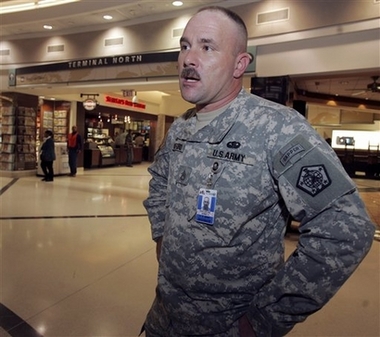War-weary Americans weigh new Bush plan
(AP)Updated: 2007-01-11 13:46
Wearied by war, Americans paused Wednesday to listen to President Bush's plan to send 21,500 more troops to Iraq, responding with frustration, puzzlement and, in some cases, cautious hope.
At a diner called Miss Katie's in downtown Milwaukee, office manager Dave Berndt said Bush seemed to be "apologizing for what's going on so far, and almost apologizing in advance for what's going on afterwards."
Nearby, bartender Joe Sardino was more blunt: "I think this is a Band-Aid on a large wound."
Going head-to-head with Democrats who have called for an end to the war, Bush said an American pullback now would shatter the Iraqi government and lead to "mass killings on an unimaginable scale."
Still, the president was speaking to a nation that has in large part soured on the war, which this spring will enter its fifth year and which last month cost its 3,000th American life.
An Associated Press-Ipsos poll in December put approval of Bush's handling of the war at 27 percent, a record low, and a majority of voters interviewed in exit polls during the midterm elections said they favored pulling some or all troops from Iraq.
Even among Americans who applauded Bush's decision to bolster the American military presence in Iraq, there were questions about why the reinforcements were only being sent now.
"I'd love to know what took him so long to come to this realization," said Wayne Muller, who watched the speech from his home in Raleigh, N.C., and whose son, Cpl. Danny Muller, serves in Iraq's volatile Anbar province.
"We either have to get the troops in there to get the job done or bring them home," Muller said.
In other quarters, there was clear frustration.
Brad Rosen, a 24-year-old Harvard Law student who watched the speech among a crowd of about 100 at Cambridge Common bar, seized on Bush's assertion that 80 percent of the sectarian violence in Iraq is concentrated near Baghdad.
"Where was that information a year ago, when I would have said increase the troops?" Rosen asked. "But now it seems like a defense posture."
Bush called the increase in American force a change in course in the Iraq war, and said failure in Iraq would a be "a disaster for the United States." His speech appeared to stir hope in some that the war might turn for the better.
A handful of veterans gathered at an American Legion post in Killeen, Texas, near Fort Hood, to watch the speech. There, 59-year-old Dave Washko, who called himself "just an old soldier," said he supported Bush.
"I'm just praying it works," he said.
Another veteran there, George Payntar, who served in the Vietnam war, added: "If we pull out, they'll be here. I am afraid if we pull out now, we would lose the progress we made and the Iraqi people would suffer greatly."
At the Atlanta airport, a few dozen Army recruits were gathered, waiting to travel to Fort Benning to start boot camp on Thursday. They seemed weary of political talk and eager for action.
"There's been a lot of talk about strategies," said Jesse Weber, 21, of Richland Center, Wis. He said he hoped Americans who do not support the war would still "support the soldiers," and said he thought Bush "has been kind of slow making his decisions."
The steady slide in public support for the war has been remarkable: Even in Utah, a Bush electoral stronghold, a recent Salt Lake Tribune poll found less than half of respondents supported the Bush war plan.
"I was pleased that he didn't try to be overly optimistic," said Bart Barker, 52, who watched the Bush address from his home in Draper. "The way he talked about deploying added troops does give me a little hope."
Barbara Early, who noted she had read the Iraq Study Group report - which called the situation in Iraq deteriorating and suggested America begin a troop pullback by next year - was less optimistic.
"It just seems unsupported by all the expert opinion, against the prevailing wisdom of everyone, except people in his administration," Early said at the San Francisco sports bar where she watched the speech.
At the upscale restaurant and bar Novecento, in Miami's financial district, patrons seemed more interested in the television screens showing Cirque Du Soleil than the president's speech.
But many who did watch it said they were cautiously hopeful.
"I have no idea if this is going to work," said Richard Earl, a 33-year-old money manager. "But he's got a plan. Let's hope it does."
|
||
|
||
|
|

